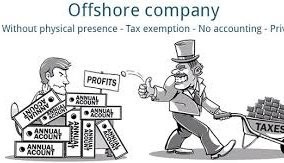Expert Guidance for Offshore Company Formation: Simplifying the Process
Expert Guidance for Offshore Company Formation: Simplifying the Process
Blog Article
Master the Art of Offshore Business Formation With Specialist Tips and Approaches
In the world of worldwide service, the facility of an overseas company demands a strategic strategy that surpasses plain documentation and filings. To navigate the intricacies of overseas firm formation effectively, one should be fluent in the nuanced suggestions and strategies that can make or break the process. By recognizing the advantages, complexities of territory choice, structuring strategies, compliance needs, and recurring administration basics, one can open the full possibility of offshore entities. These skilled insights use a look into a globe where savvy decisions and thorough planning lead the way for success in the worldwide service landscape.
Advantages of Offshore Company Development

Establishing an overseas company provides a variety of advantages for services seeking to maximize their economic operations and worldwide existence. One of the primary benefits is tax obligation optimization. Offshore territories often offer favorable tax frameworks, permitting companies to lower their tax obligation burdens lawfully. This can lead to substantial price savings, improving the firm's productivity over time.
In addition, overseas firms use improved privacy and discretion. In several jurisdictions, the details of company ownership and monetary information are maintained confidential, giving a layer of security against rivals and possible dangers. This confidentiality can be especially helpful for high-net-worth individuals and businesses operating in sensitive markets.
Moreover, overseas companies can help with global service development. By developing an existence in several territories, firms can access brand-new markets, diversify their revenue streams, and mitigate dangers connected with operating in a single area. This can lead to raised resilience and growth chances for business.

Picking the Right Jurisdiction
Due to the numerous benefits that offshore business development can provide, an essential tactical factor to consider for companies is choosing one of the most appropriate jurisdiction for their operations. Choosing the appropriate territory is a choice that can substantially influence the success and efficiency of an overseas company. When selecting a jurisdiction, elements such as tax guidelines, political stability, legal structures, privacy legislations, and reputation needs to be thoroughly examined.
Tax policies play an important function in determining the financial benefits of running in a certain territory. Some overseas places provide favorable tax obligation systems that can aid services reduce their tax obligation responsibilities. Political stability is vital to make sure a protected business atmosphere without prospective disturbances. Lawful structures differ throughout territories and can affect how businesses run and solve disagreements. offshore company formation.
Choosing a territory with a strong track record can boost reputation and trust in your overseas company. Mindful factor to consider of these variables is vital to make an informed decision when picking the ideal territory for your overseas company formation.

Structuring Your Offshore Business
The method you structure your overseas company can have significant effects for tax, responsibility, compliance, and total functional effectiveness. Another method is to develop a subsidiary or branch of your existing firm in the offshore territory, enabling for closer integration of procedures while still profiting from offshore benefits. offshore company formation.
Factor to consider must additionally be provided to the ownership and administration framework of your overseas company. Decisions relating to investors, supervisors, and police officers can impact governance, decision-making processes, and regulatory responsibilities. It is suggested to seek expert guidance from lawful and economists with experience in offshore company formation to ensure that your chosen framework aligns with your business goals and adhere to relevant laws and regulations.
Compliance and Law Basics

Involving with legal consultants or compliance specialists can supply beneficial advice in navigating intricate regulatory frameworks. By prioritizing compliance and regulation basics, offshore companies can run fairly, reduce risks, and construct trust with stakeholders and authorities.
Upkeep and Ongoing Management
Reliable administration of an overseas company's ongoing upkeep is essential for guaranteeing its long-term success and conformity with governing requirements. Normal upkeep jobs consist of upgrading corporate documents, renewing licenses, submitting annual reports, and holding shareholder meetings. These tasks are crucial for keeping excellent standing with authorities and preserving the lawful status of the offshore entity.
Additionally, recurring monitoring includes overseeing financial transactions, monitoring compliance with tax obligation regulations, and adhering to reporting requirements. It is necessary to designate professional specialists, such as accounting professionals and lawful advisors, to help sites with these obligations and ensure that the firm operates efficiently within the confines of the law.
In addition, remaining notified regarding modifications in legislation, tax obligation legislations, and conformity requirements is extremely important for effective continuous monitoring. On a regular basis assessing and upgrading company administration techniques can help alleviate dangers and ensure that the offshore business remains in excellent standing.
Conclusion
Finally, grasping the art of offshore company formation needs mindful consideration of the benefits, territory option, company structuring, compliance, and recurring monitoring. By understanding these essential aspects and applying skilled tips and methods, people can effectively establish and preserve overseas business to optimize their company opportunities and economic benefits. It is necessary to prioritize compliance with guidelines and diligently take care of the business to make sure long-lasting success in the overseas company setting.
Report this page